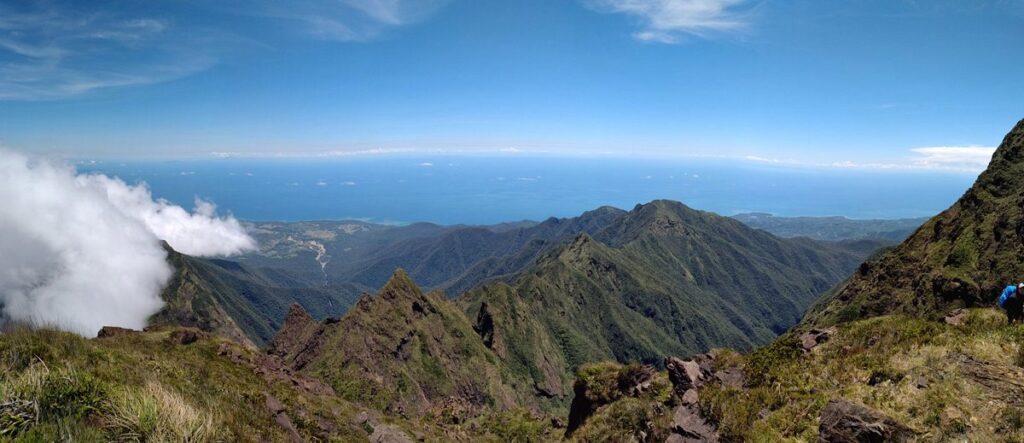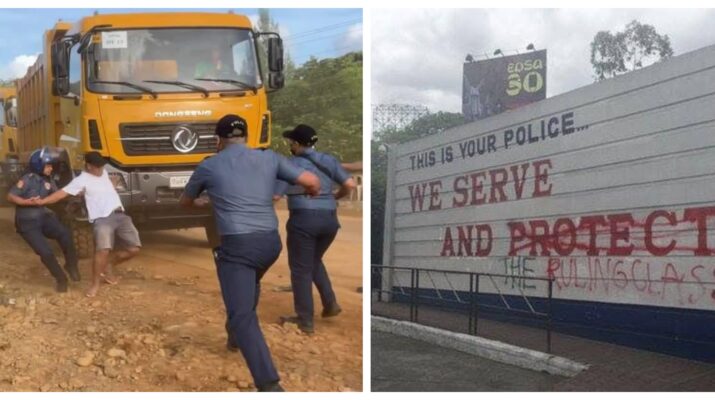“We serve and protect”, reads the motto of the Philippine National Police (PNP) – a motto which most Filipinos are familiar with. However, the jury is still out on who it is exactly the PNP is meant to serve and protect.
If the incident that unfolded in Sibuyan Island last month were anything to go by, the answer is clearly that they serve and protect the interests of the ruling class.
On February 3, a human barricade was formed by residents of Sibuyan Island – a heavily forested island in the province of Romblon, which is home to rich biodiversity – to stop a mining company’s trucks from entering their community.
Altai Philippines Mining Corporation (APMC) have been accused of conducting illegal mining operations in the island. The mining firm had also built a private port in Sibuyan Island to transport the nickel ore they extract to market, which the Philippine Ports Authority (PPA) said did not have clearance.
It was this access to the private port that Sibuyan Island residents, alongside environmental activists, were barricading – hoping to deter illegal mining operations by the company in their hometown.
Rather than holding the mining firm’s trucks in custody and shutting down the mine, Philippine Police instead dispersed the activists leaving two persons hurt. Several were also handcuffed by authorities, only to be released shortly after being filmed by spectators.
Elizabeth Ibañez, coordinator of the group Sibuyanons Against Mining, told CNN Philippines in an interview: “Why do they treat those who help to implement the law, especially on environmental protection, as the enemy?”
![Uniformed police personnel disperse Sibuyan Island residents barricading the entry of mining trucks to a private port. [Photo: Philippine Alliance of Human Rights Advocates Facebook page]](https://thedefiant.net/wp-content/uploads/2023/03/TD_AlyansaTigilMinaSibuyanIsland_PhilippineAllianceofHumanRightsAdvocates-1024x768.jpg)
In 2011, the Department of Environment and Natural Resources (DENR) cancelled the firm’s mining permit in Sibuyan Island after a town mayor protested the mining operations’ effect on the island’s biodiversity and livelihood.
That mayor, then-San Fernando, Romblon town Mayor Dindo Rios, also disclosed that the mining permit issued to APMC was a “midnight deal” – signed by then-DENR Secretary Lito Atienza with the mining firm less than a month before an election ban on contract signings by department heads.
Aside from the questionable contract that APMC was given, Sibuyan Island also boasts a wealth of biodiversity and fauna which would be endangered by mining operations in the island.
Many of the species found on Sibuyan Island are also on the International Union for the Conservation of Nature’s Red List of Threatened Species, including the Philippine Tube-nosed Fruit Bat (Nyctimene rabori) and the Philippine long-tailed macaque (Macaca fascicularis philippensis).
Sibuyan Island is also believed to have one of the densest forests in the world, with an estimated 1,551 trees per hectare and is the site of the famous Mount Guiting-Guiting Natural Park – a popular hiking destination for tourists.

With such a rich variety of both flora and fauna being threatened by mining activities, the human barricade formed by activists against APMC’s mining trucks were justifiable. Sibuyan Island and the environment itself has so much to lose if mineral extraction would continue on the island.
Yet, despite the fact that those activists were merely protecting the natural environment from the profiteering aims of APMC, the PNP still fixated on apprehending these activists rather than ceasing mining operations of a firm that has an unscrupulous record and whose authority to mine is questionable to begin with.
Rather than protecting the natural wealth of the country, the Philippine Police were more concerned about defending the material wealth of an already wealthy mining corporation.
Back to the question of who it is exactly the PNP are meant to serve and protect, with their actions in Sibuyan Island it is clear that it is the interests of the ruling class.

